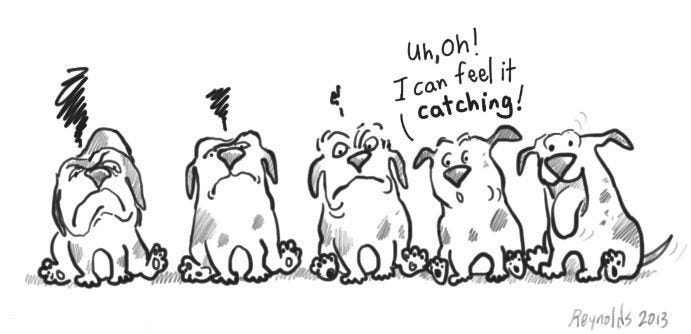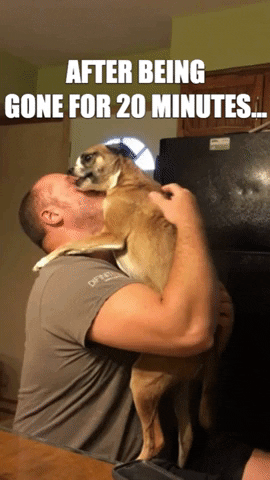Today, let’s chat about one of my favorite subjects. Dogs. I love dogs. I keep dog treats in my golf cart. And carry biscuits in my pocket whenever I go for a walk. Even though now, I no longer have a dog. I live vicariously through other peoples’ dogs.
As a kid, and later as an adult, I had dogs. There were Scotties, a collie, a lab, and some Heinz 57 Variety dogs. Tammy, Mimi, Fern, Weejie, Muttsie, Fang, Hoosier, O.D. (Other Dog). A couple of purebreds. Some from the SPCA. And a few bedraggled ones that just showed up on our doorstep.
I believe that dogs are like people….only better! They wiggle and tail-wag when we are happy and nudge their noses and snuggle their warm, furry bodies next to us when we are sad.
My dogs understood me better than most humans. And they were a lot less complicated, if you get my drift!
And now, oh joy…. my belief in the human behavior of dogs has been validated by scientific research!
Why is this so important (Other than I love validation…)? Because in addition to discovering that dogs have human emotions, studies also show that our behaviors and emotions can have real consequences for our pets. Both positive and negative.

Dogs exhibit a very basic form of empathy called ‘emotional contagion’. Emotional contagion means that you ‘catch’ the emotions and behaviors of those around you. Kind of like a virus. But without a vaccine.
Have you ever been next to someone who starts yawning? And then you start yawning. Or someone who starts giggling. And pretty soon you are giggling, too. It’s contagious, right?
We’ve known for a long time that we can ‘catch’ the emotions and behaviors of those around us. And now we know that dogs can ‘catch’ our emotions and behaviors, too. Dogs will often look at people’s faces to figure out how they are supposed to react to people and situations around them.
According to one study, dogs can match their behavior to 6 different human expressions: anger, fear, happiness, sadness, surprise, and disgust.
I’ve written before about how happy humans release oxytocin, giving them a feeling of well-being that can also lower stress and anxiety. What I didn’t know is that dogs release oxytocin when they feel happy, just like humans. Some dogs also release the stress hormone, cortisol, when they experience fear. When happiness is written all over your face, you are helping your dog feel great. When you show fear or anger, you create stress and anxiety in your dog.
If you’re a dog owner, you’ve undoubtedly experienced the snowball effect of emotional contagion. For example, if your dog growls at someone and you get stressed out, your dog picks up on your stress, which just makes the situation worse.
On the happier side, picture welcoming friends as they come into your home. Sensing your excitement, your dog starts to jump up and down in enthusiastic support! You say to your guests, “I don’t know why he jumps up. He knows better.” But Fido is just a victim of your emotional contagion!
On the flip side, dogs also influence our emotions and behaviors by their expressions and behaviors. It’s pretty hard not to smile when you see a dog wiggling and wagging his way toward you.
Experts believe that dogs have evolved over 30,000+ years to understand human behavior. It seems that dogs not only can react to your behavior, but they have learned a little trick to help manipulate your behavior in their favor.
Although dogs are descended from wolves, researchers have discovered that dogs have developed an ‘inner eyebrow’ muscle that wolves don’t have. Dogs use this muscle to raise their inner eyebrow, which makes their eyes look bigger, sadder, and more expressive. Studies prove that dogs raise their inner eyebrow significantly more when humans are looking at them. The theory is that dogs have learned over time that humans respond more positively and kindly to them when they do this, indicating that dogs understand the power of facial expressions. The next time your pooch gives you that ‘aren’t I cute and pathetic’ look, you now know they are on to you.
Now that you have a better understanding of your pup’s behaviors and emotions, you can make a big difference in their day, just by working on displaying happier, more positive expressions and emotions. A little kindness toward your dog will go a long way toward helping them be kinder and happier, too. Sounds like a win-win to me.
Your turn: If you have, or have ever had a dog, what stories do you have that prove emotional contagion? Do you agree with the results of these studies? I’d love to hear about your pups in the comments below. And my apologies to you cat owners, since these studies were just about dogs. Your stories are welcome, too!
May your week be filled with kindness. 💜
If you haven’t already signed up for Kindness Magnet, please subscribe below. It’s free.
Or share this story with a friend who has a dog!



















Share this post